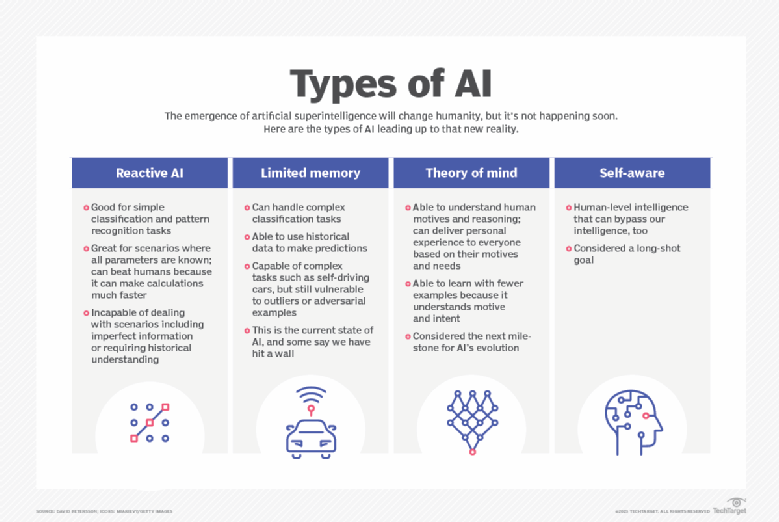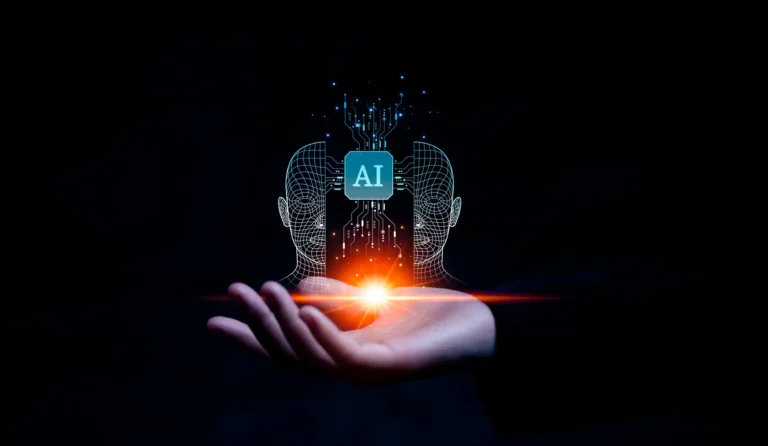Introduction
Artificial Intelligence (AI) is revolutionizing the world we live in, making an impact across industries and transforming the way we live and work. In this blog post, we will delve into the fundamentals of AI, explore its applications across various sectors, and discuss the ethical considerations that come with this technology. Let’s embark on a journey to better understand the present and future landscape of Artificial Intelligence.
The Fundamentals of AI
To comprehend the power of AI, it is essential to grasp the fundamentals that drive its capabilities. Machine Learning and Deep Learning are at the core of AI, enabling machines to learn from experience and make informed decisions.
Machine Learning: The Backbone of Artificial Intelligence
Machine Learning algorithms process data to automatically learn and improve from experiences. There are three main types of Machine Learning: Supervised Learning, Unsupervised Learning, and Reinforcement Learning.
- Supervised Learning: Enhancing Predictive Capabilities
Supervised Learning algorithms learn from labeled data to make predictions and classifications. This technique is used in various domains, such as spam email filtering and credit scoring. - Unsupervised Learning: Discovering Patterns and Insights
Unsupervised Learning allows machines to analyze unstructured data without pre-defined labels. By uncovering hidden patterns and structures, this approach is useful for customer segmentation and anomaly detection. - Reinforcement Learning: Achieving Autonomous Decision-Making
Reinforcement Learning uses a trial-and-error approach to learn optimal decision-making policies. This technique has revolutionized fields like robotics and self-driving cars, enabling machines to navigate and make decisions in complex environments.
Deep Learning: Unearthing Complex Patterns
Deep Learning is a subset of Machine Learning that utilizes neural networks to mimic human brain functionality. It is responsible for solving complex problems and has shown remarkable advancements in various applications.
- Neural Networks: Mimicking Human Brain Functionality
Inspired by the human brain, neural networks consist of interconnected nodes (neurons) that process and transmit information. By leveraging layers and nodes, neural networks excel at image recognition, speech synthesis, and other cognitive tasks. - Convolutional Neural Networks (CNNs): Advancing Image Processing
CNNs specialize in processing visual data, making them ideal for tasks such as image classification and object detection. By applying convolutions and pooling operations, CNNs can extract meaningful features from images. - Recurrent Neural Networks (RNNs): Enabling Sequence Modeling
RNNs process sequential data, making them valuable for tasks like speech recognition and language modeling. Their ability to retain information from previous inputs allows them to capture contextual dependencies within sequences.
Read also: What is a LLM?
Natural Language Processing (NLP): Bridging Man and Machine Communication
NLP focuses on enabling computers to understand and interact with human language. It encompasses various techniques and applications that facilitate effective communication between humans and machines.
- Sentiment Analysis: Interpreting Emotions and Opinions
Sentiment Analysis utilizes AI algorithms to identify and interpret emotions and opinions expressed in text. This technology has been widely used in social media monitoring, customer feedback analysis, and brand reputation management. - Language Translation: Breaking Down Language Barriers
With the power of AI, language translation has become more accurate and efficient. Machine Translation models, such as Google Translate, utilize NLP techniques to convert text from one language to another, facilitating global communication. - Chatbots: Enhancing Customer Support and User Interaction
Chatbots leverage NLP algorithms to engage in conversations with users, providing prompt and personalized assistance. They are widely used in customer support services, automating repetitive tasks and improving user experience.
AI Applications Across Industries
The realm of Artificial Intelligence extends to various industries, transforming operations and driving innovation across sectors. Let’s explore how AI is revolutionizing healthcare, transportation, finance, and retail.
Healthcare: Revolutionizing Diagnosis and Treatment
AI is reshaping healthcare by improving diagnostics, personalizing treatments, and enhancing medical imaging.
- Disease Prediction: Early Identification for Improved Outcomes
AI algorithms can analyze large amounts of patient data to identify early signs of diseases. For example, Machine Learning models have been developed to predict the risk of cardiovascular diseases based on various health parameters. - Precision Medicine: Tailoring Treatment Plans for Individuals
By analyzing genomic data and patient records, AI enables personalized treatment plans. This approach has already shown promise in cancer treatment, making interventions more effective and reducing unwanted side effects. - Medical Imaging: Enhancing Accuracy in Radiology
AI-powered algorithms have the ability to detect anomalies and assist radiologists in accurately interpreting medical images. Identifying cancerous tumors or analyzing X-rays for fractures are some applications that benefit from this technology.

Transportation: Paving the Way for Autonomous Vehicles
AI is playing a significant role in the development of autonomous vehicles, improving safety, optimizing traffic, and reducing downtime.
- Object Detection: Ensuring Safety on the Roads
AI algorithms can accurately identify and track objects on the road, including pedestrians and vehicles. This capability is crucial for autonomous vehicles to navigate in complex environments, reducing the risk of accidents. - Traffic Optimization: Smarter City Planning
Using AI, traffic patterns can be analyzed to optimize traffic flows and reduce congestion. By leveraging real-time data and predictive models, AI enables smarter city planning and efficient transportation systems. - Predictive Maintenance: Reducing Vehicle Downtime
AI algorithms can analyze sensor data to detect signs of potential vehicle failures. By predicting maintenance needs in advance, businesses can proactively address issues, minimizing downtime and optimizing operations.
Finance: Empowering Intelligent Decision-Making
AI technologies are transforming the finance sector by improving fraud detection, enhancing risk assessment, and personalizing customer service.
- Fraud Detection: Strengthening Security Measures
AI algorithms can detect patterns and anomalies in financial data, helping to identify fraudulent activities. These models are critical for protecting customers’ assets and ensuring the security of financial transactions. - Risk Assessment: Improving Investment Strategies
AI-based risk assessment models can analyze vast amounts of data and provide insights into investment decisions. These models help financial institutions make informed choices, increase profitability, and manage risk effectively. - Customer Service: Personalizing Assistance and Support
AI-powered chatbots and virtual assistants are enhancing customer service in the finance industry. These virtual agents can provide personalized support, help customers with their queries, and streamline banking processes.
Retail: Enhancing Customer Experience and Sales
AI is reshaping the retail industry by personalizing recommendations, optimizing supply chains, and improving online shopping experiences.
- Recommendation Systems: Tailoring Product Suggestions
AI algorithms analyze customer preferences and buying patterns to provide personalized product recommendations. This technology has significantly improved cross-selling and upselling opportunities for retailers. - Supply Chain Optimization: Streamlining Inventory Management
AI enables retailers to efficiently manage their inventory through accurate demand forecasting and optimized supply chain processes. By reducing stockouts and minimizing excess inventory, businesses can increase profit margins. - Virtual Assistants: Revolutionizing Online Shopping Assistance
Voice-activated virtual assistants, such as Amazon’s Alexa, are transforming the way customers interact with online retailers. These virtual shopping assistants provide personalized product recommendations, answer queries, and simplify the online shopping experience.
Ethical Considerations in AI
While the potential of AI is vast, it is essential to address the ethical considerations that arise with its implementation. Let’s explore the key ethical concerns surrounding AI.
Bias in AI: Addressing Discrimination and Fairness Issues
AI systems can unintentionally inherit biases present in the data they are trained on. Addressing biases is crucial to ensure fair and unbiased decision-making processes.
- Data Bias: The Impact on Algorithmic Decision-Making
Biased data used to train AI algorithms can lead to discriminatory outcomes. It is essential to continuously assess and mitigate biases in training data to avoid perpetuating inequalities in algorithmic decision-making. - Gender and Racial Bias: Implications in AI Systems
AI systems can amplify existing gender and racial biases present in society. Companies must actively work to eliminate biases, ensuring fairness and equal opportunities for all individuals. - Mitigating Bias: Ensuring Algorithmic Transparency and Accountability
Transparency and openness are critical in addressing bias. Organizations must develop methods for auditing AI algorithms, ensuring they align with ethical standards and mitigating any potential bias.
Privacy and Security Concerns in AI
As AI evolves, privacy and security concerns become more prevalent. Safeguarding personal information and protecting AI systems from external threats is of paramount importance.
- Data Protection: Safeguarding Personal Information
AI relies heavily on data, including personal and sensitive information. It is crucial to implement robust security measures to protect individual privacy and prevent data breaches. - Cybersecurity Risks: Guarding AI Systems against Attacks
As AI becomes more integrated into different domains, the risk of malicious attacks on AI systems increases. Organizations must prioritize cybersecurity measures to safeguard AI infrastructure and prevent unauthorized access. - Ethical Use of AI: Balancing Innovation with Responsible Practices
AI should be developed and implemented in a way that upholds ethical practices and aligns with legal frameworks. Organizations should establish clear guidelines and standards for the responsible use of AI, ensuring the technology serves the best interests of society.
Job Displacement: Navigating the Future of Work
The rise of automation powered by AI has raised concerns about job displacement and the changing nature of work.
- AI’s Impact on Employment: Separating Myths from Reality
While some jobs may be replaced by AI, new opportunities and job roles are emerging. AI is more likely to augment existing jobs rather than entirely eliminate them. - Upskilling and Reskilling: Preparing for a Transformed Job Market
As AI advances, possessing a mix of technical and soft skills becomes crucial. Upskilling and reskilling programs should be implemented to ensure individuals are prepared for the transformed job market. - Collaboration between Humans and Machines: Shaping the Workforce of Tomorrow
AI is best utilized when humans collaborate with machines. By finding the right balance between human expertise and AI capabilities, organizations can create a symbiotic relationship that leads to increased productivity and innovation.
Summary
AI has come a long way, evolving from simple algorithms to advanced machine learning and deep learning techniques. We explored the fundamentals of AI, including Machine Learning, Deep Learning, and Natural Language Processing. We discovered the transformative applications of AI across industries, such as healthcare, transportation, finance, and retail. Additionally, we addressed the critical ethical considerations that come with AI implementation, including bias, privacy, security, and job displacement. As we move forward, it is crucial to leverage AI’s potential while addressing the challenges and ensuring responsible and ethical use.
Frequently Asked Questions (FAQs)
Now, let’s address some frequently asked questions about Artificial Intelligence.
What is Artificial Intelligence, and how does it work?
Artificial Intelligence (AI) refers to the development of computer systems that can perform tasks that typically require human intelligence. AI works by processing large amounts of data, utilizing algorithms to learn patterns, make decisions, and continuously improve performance.
How is AI transforming different industries?
AI is transforming industries in various ways. In healthcare, AI is revolutionizing diagnosis and treatment. In transportation, AI is paving the way for autonomous vehicles. In finance, AI is empowering intelligent decision-making. In retail, AI is enhancing customer experience and sales.
What ethical concerns surround AI implementation?
Some ethical concerns surrounding AI implementation include bias in AI decision-making, privacy and security issues, and job displacement. It is crucial to address these concerns to ensure AI is developed and deployed responsibly.
Will AI eliminate jobs entirely?
While AI may automate some routine tasks, it is unlikely to eliminate jobs entirely. Instead, AI is more likely to augment existing jobs and create new opportunities. A balanced approach that combines human expertise with AI capabilities is essential for the future of work.
How can society ensure the responsible use of AI?
Society can ensure the responsible use of AI by implementing ethical guidelines, promoting transparency and accountability, and fostering collaboration between different stakeholders. It is essential to prioritize the long-term benefits of AI while addressing the potential risks and challenges it poses.
By understanding the fundamentals, applications, and ethical considerations of AI, we can navigate the evolving landscape of Artificial Intelligence and harness its potential for a better future.

